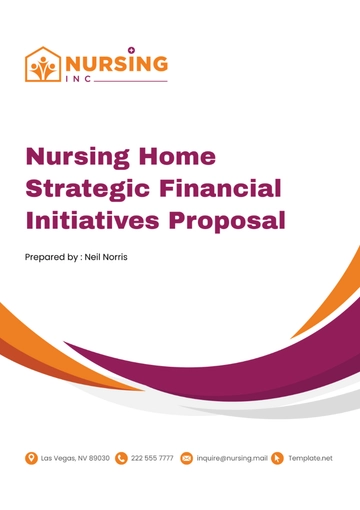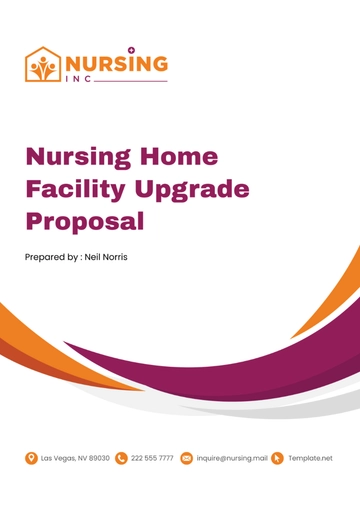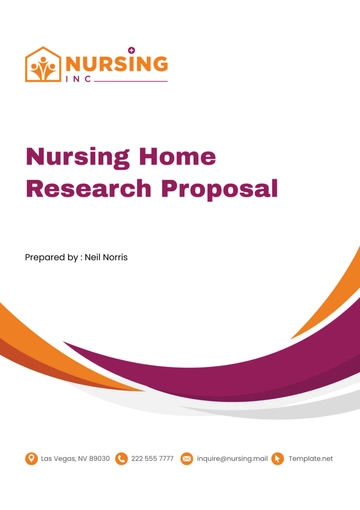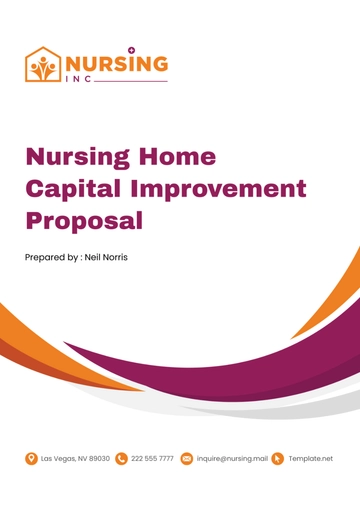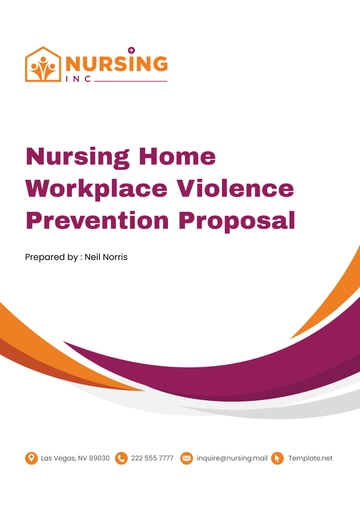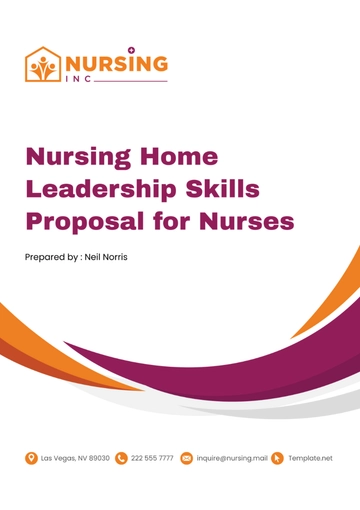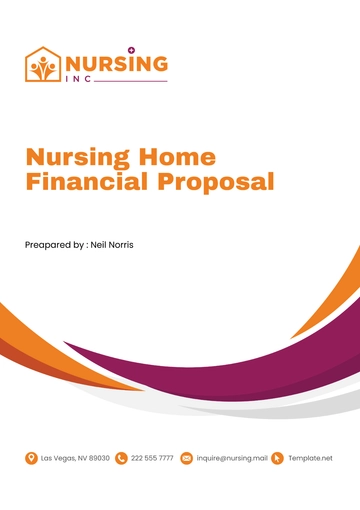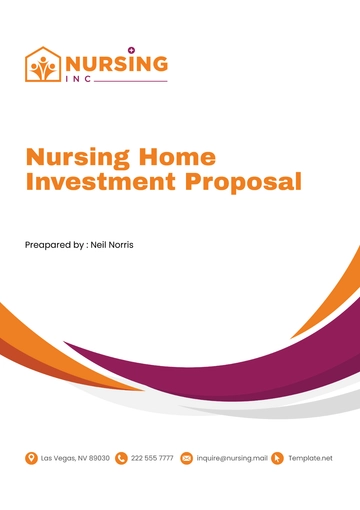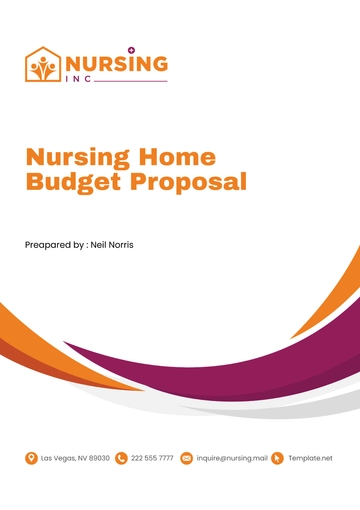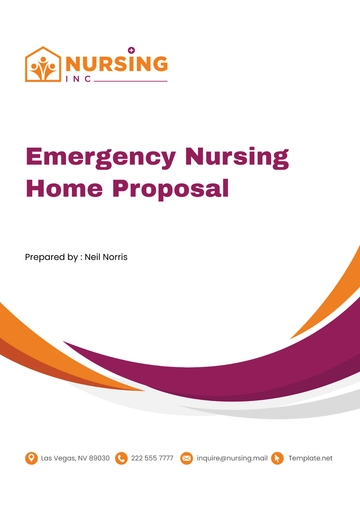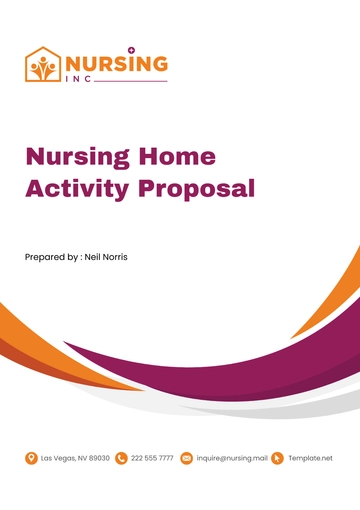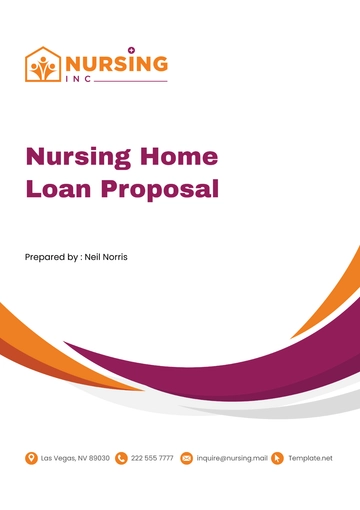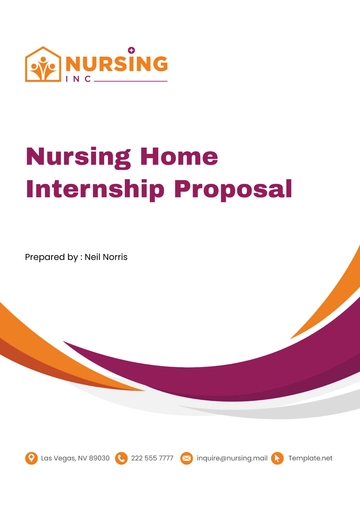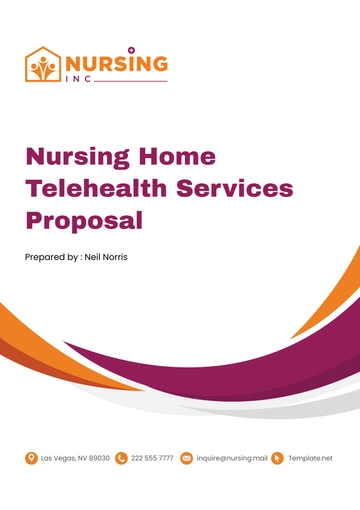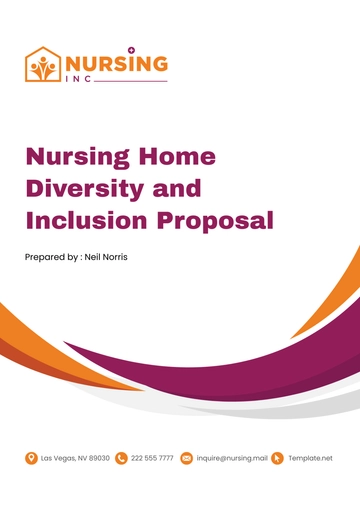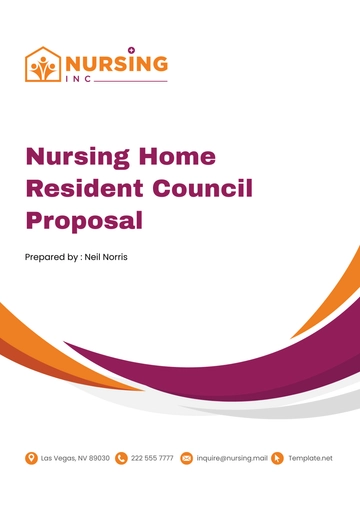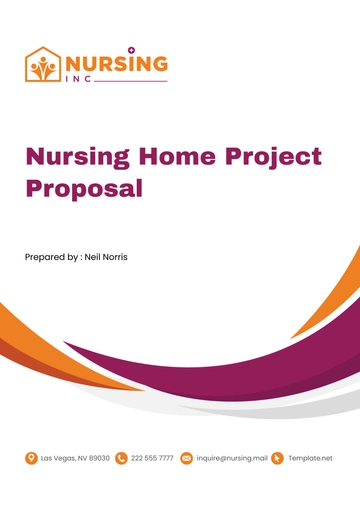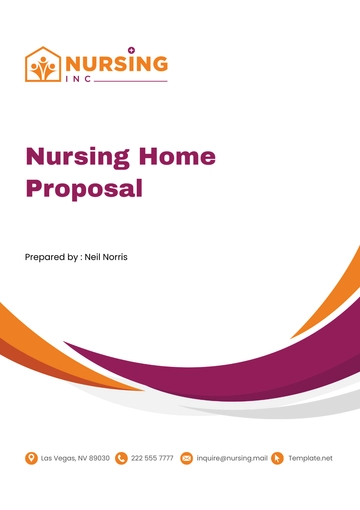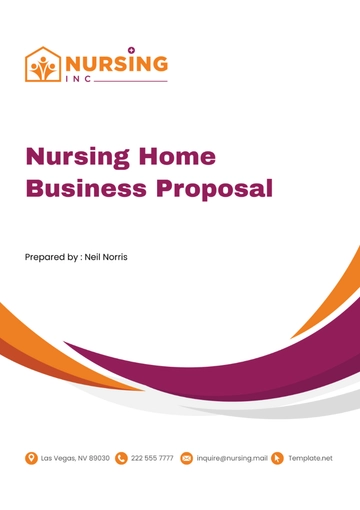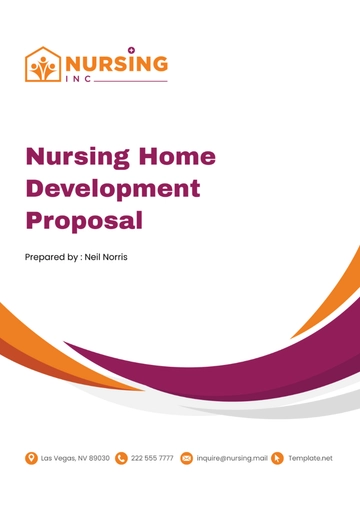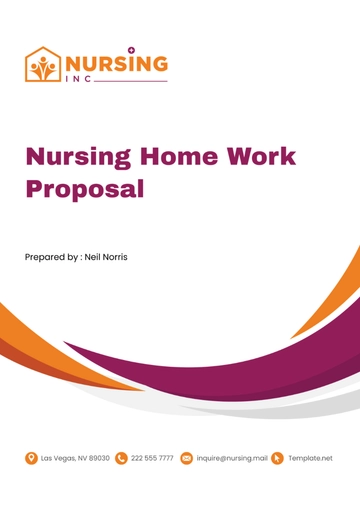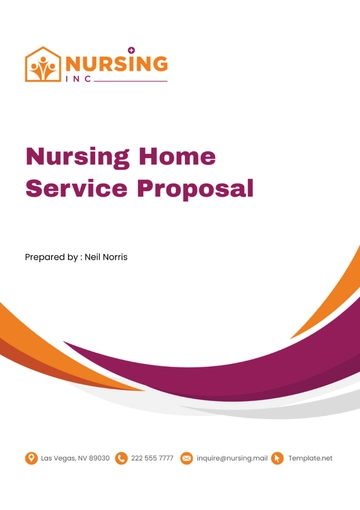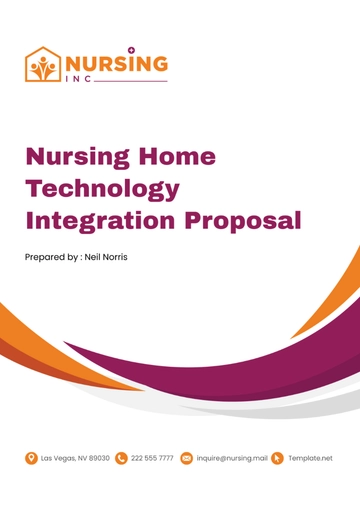Free Nursing Home Resident Council Proposal
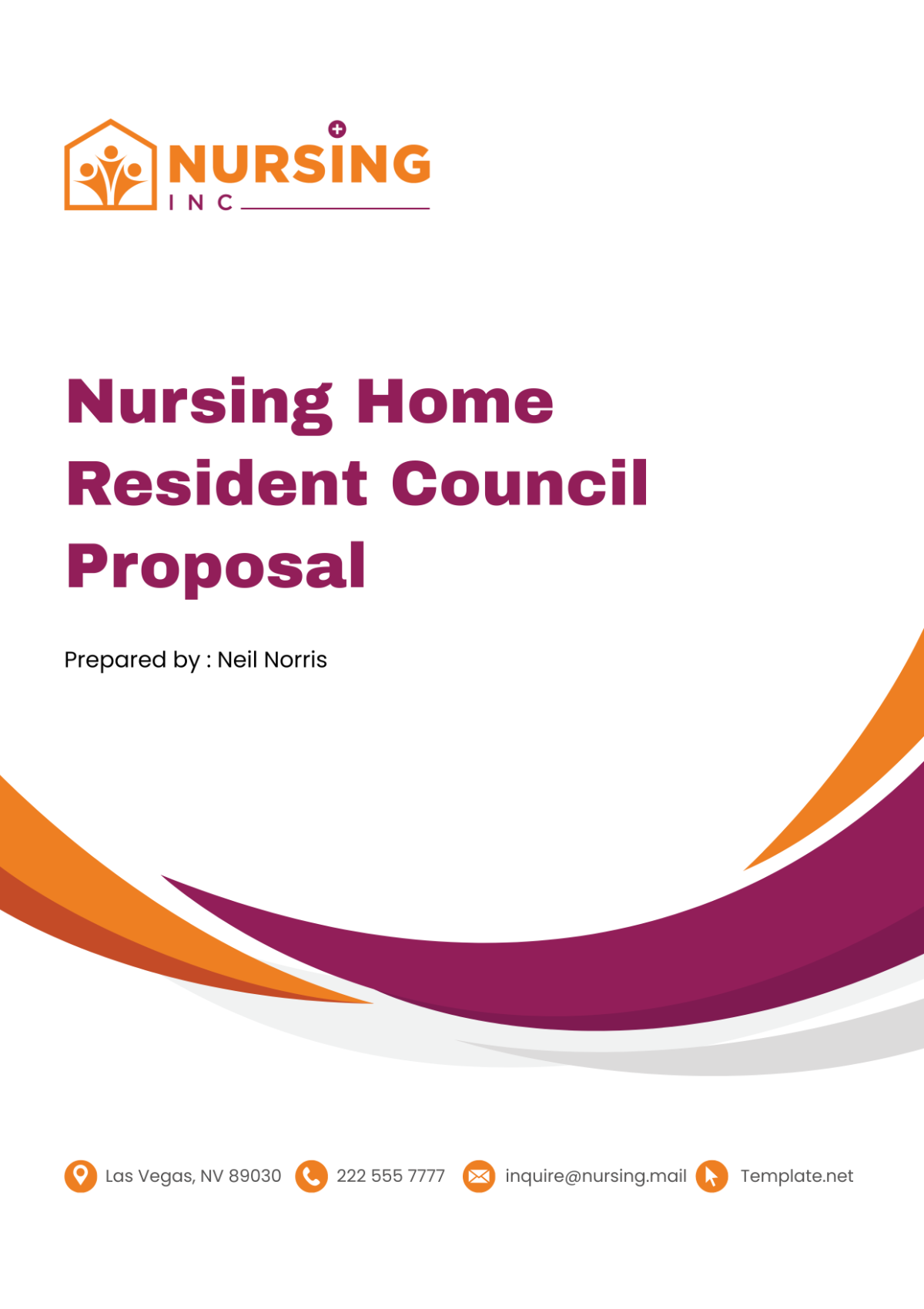
I. Executive Summary
This proposal outlines the formation and operation of a Resident Council at [Your Company Name] Nursing Home, aiming to enhance the quality of life for our residents through active participation and direct communication with the management and staff. Establishing a Resident Council is proposed as a strategic initiative to foster a more inclusive, responsive, and resident-centered care environment. This initiative is aligned with our commitment to excellence in care, respect for resident autonomy, and continuous improvement of our services and facilities.
II. Introduction
A Resident Council is a collective of nursing home residents who meet regularly to discuss matters concerning daily life, care, and activities within the facility. It serves as a formal platform for residents to voice their needs, preferences, and concerns, and to participate directly in decision-making processes that affect their lives. The establishment of a Resident Council at [Your Company Name] is driven by the recognition that our residents are the foremost stakeholders in our community. Their insights, experiences, and feedback are invaluable resources for enhancing the quality of care and life within our home.
Goals and Objectives
Enhance Resident Participation: Empower residents to have a voice in decisions that affect their daily lives and overall well-being.
Improve Quality of Life: Identify and address areas for improvement in services, activities, and care practices based on resident feedback.
Strengthen Community: Foster a sense of belonging and community among residents, promoting mutual support and engagement.
III. Background and Rationale
In recent evaluations and feedback sessions, residents at [Your Company Name] have expressed a desire for more active participation in the decisions that affect their living conditions, activities, and care. Issues ranging from dining menu selections to activity programming and facility policies have been highlighted as areas where residents seek more influence.
The formation of a Resident Council responds directly to these needs, providing a structured mechanism for resident involvement. It aligns with best practices in long-term care by promoting resident rights, autonomy, and participation, as endorsed by healthcare standards and advocacy groups.
IV. Proposed Structure of the Resident Council
The Resident Council will be composed of resident members, with support from a staff liaison appointed by the nursing home administration. Membership will be open to all residents, ensuring diverse representation.
Leadership and Committees
Leadership Roles: President, Vice-President, Secretary, chosen annually by council member vote.
Committees: To address specific areas (e.g., Dining, Activities, Safety), committees will be formed based on interest and need.
Role | Responsibilities |
|---|---|
President | Lead meetings represent the council in discussions with management. |
Vice-President | Assist the President, and assume leadership in their absence. |
Secretary | Keep meeting minutes, manage documents and communicate with other individuals |
Membership
Every single resident within the facility is qualified and allowed to join the Council. Significant efforts are being exerted to ensure that there is a fair and equal representation from the various wings of the facility, as well as from the different levels of care provided within the institution.
V. Functions and Responsibilities
The Council will serve as a forum for discussion, advocacy, and action on matters affecting resident life. Responsibilities include:
Function | Details |
|---|---|
Issue Identification | Collect and prioritize issues for discussion. |
Recommendation Development | Develop recommendations for management based on collective input. |
Follow-up | Track the progress of implemented changes and provide feedback. |
VI. Benefits of the Resident Council
The establishment of the Resident Council at [Your Company Name] Nursing Home is anticipated to bring numerous benefits that align with our mission to provide a nurturing, engaging, and secure environment for all residents. These benefits not only enhance individual resident experiences but also contribute to the overall positive culture within our community.
Enhanced Communication and Transparency
By providing a formal platform for discussion and feedback, the Resident Council will serve as a vital communication link between residents and management. This open line of communication ensures that residents' voices are heard and considered in decision-making processes, leading to increased transparency in how decisions are made and implemented within the facility.
Direct Feedback Loop: Regular meetings and discussions with management allow for immediate sharing of concerns and suggestions, speeding up the resolution process.
Transparency in Operations: Open discussions about facility policies, care protocols, and day-to-day operations help demystify management decisions, fostering a culture of transparency.
Increased Resident Satisfaction and Empowerment
Active participation in the Resident Council empowers residents by giving them a stake in their living environment and care. This empowerment is crucial for resident satisfaction, as it makes residents feel valued and respected as integral members of the community.
Sense of Agency: Being able to influence decisions affecting their lives increases residents' sense of agency and control, which is essential for psychological well-being.
Improved Quality of Life: Through the Council, residents can directly advocate for improvements and enhancements that matter to them, directly impacting their quality of life.
Strengthened Community and Resident Morale
The collaborative nature of the Resident Council fosters a strong sense of community among residents. By working together towards common goals, residents build meaningful relationships with their peers, which is fundamental to creating a supportive living environment.
Peer Support: The Council provides a forum for residents to support each other, share experiences, and offer solutions, strengthening the bonds between them.
Community Engagement: Active involvement in the Council encourages a sense of belonging and investment in the community, enhancing overall morale and enthusiasm for community activities and initiatives.
Positive Impact on Facility Policies and Practices
The insights and feedback provided by the Resident Council are invaluable for informing and refining facility policies and practices. This direct input from residents ensures that changes and improvements are genuinely reflective of resident needs and preferences.
Informed Decision-Making: Management can make more informed decisions regarding care practices, amenities, and activities based on resident input, leading to more effective and appreciated changes.
Continuous Improvement: The ongoing dialogue between residents and management facilitates a culture of continuous improvement, where policies and practices are regularly evaluated and adapted to meet evolving resident needs.
Enhanced Reputation and Family Satisfaction
The presence of an active and effective Resident Council can significantly enhance the facility's reputation among current and prospective residents and their families. Knowing that residents have a voice in their care and living conditions can be a deciding factor for families when choosing a long-term care facility.
Attractiveness to Prospective Residents: A well-functioning Resident Council is a testament to the facility's commitment to resident-centered care, making it more attractive to prospective residents and their families.
Increased Family Confidence: Families can have greater confidence in the quality of care and the level of attention to resident well-being, knowing there is a formal mechanism for residents to express their needs and preferences.
VII. Implementation Plan
The implementation of the Resident Council will proceed in stages, from approval to the first official meeting:
Approval and Support: Secure endorsement from facility management and residents.
Initial Setup: Form the initial council, elect officers and establish committees.
First Meeting: Conduct the inaugural meeting to prioritize issues and set an action plan.
Timeline
Stage | Timeline |
|---|---|
Proposal Approval | Month 1 |
Council Formation | Month 2 |
First Official Meeting | Month 3 |
VIII. Support and Resources Required
For the Resident Council at [Your Company Name] Nursing Home to thrive and fulfill its mission, it will require a foundational layer of support and resources from the facility. These needs span logistical, financial, and educational domains, ensuring the council can operate effectively, address resident concerns, and implement improvements.
Staff Support
A dedicated staff liaison will play a crucial role in the council's operations, serving as a bridge between the council and the nursing home administration. This individual will assist with organizing meetings, communicating council initiatives and recommendations to management, and ensuring that feedback from the administration is relayed back to the council.
Responsibilities of the Staff Liaison:
Facilitate meeting logistics, including scheduling and room setup.
Assist with documentation, such as meeting minutes and reports.
Support the council's communication with management and external parties.
Financial Resources
While the Resident Council's operations are not expected to be heavily reliant on financial resources, a modest annual budget should be allocated to cover incidental expenses. These may include materials for meetings, special projects, or guest speakers who can provide valuable information or training to council members and residents.
Proposed Budget Items:
Meeting supplies (e.g., notepads, pens, name tags).
Refreshments for meetings to encourage attendance and participation.
Resources for special projects or initiatives approved by the council.
Training and Educational Resources
To ensure council members are well-prepared to fulfill their roles, training sessions will be provided, covering topics such as leadership, effective communication, advocacy, and the basics of long-term care management. These sessions will equip council members with the knowledge and skills needed to make informed recommendations and effectively represent their fellow residents.
Training Topics:
Leadership and team-building for council officers and committee leads.
Effective communication strategies, including conflict resolution and negotiation.
Understanding long-term care operations and regulatory standards.
Physical and Technological Resources
Meetings and other council activities will require physical spaces equipped with necessary technological aids. A designated meeting room with privacy, accessibility, and audio-visual equipment will facilitate productive discussions and presentations.
Requirements:
A meeting room that is accessible to all residents, including those with mobility aids.
Audio-visual equipment for presentations and for including remote participants, such as family members or external advisors.
Promotion and Awareness
To ensure the Resident Council is effective in gathering widespread input and maintaining transparency, resources will be dedicated to promoting council activities and achievements within the facility. This may involve creating a bulletin board for announcements, a section in the facility newsletter, or a digital platform where minutes and updates can be shared.
Promotion Strategies:
Monthly newsletter updates on council activities and highlights.
A dedicated bulletin board for meeting announcements, minutes, and ongoing projects.
An online forum or email group for council communication and resident feedback.
IX. Evaluation and Feedback
The success and effectiveness of the Resident Council at [Your Company Name] Nursing Home will be evaluated through a comprehensive annual review process, incorporating both quantitative metrics and qualitative feedback. This evaluation is critical for ensuring the Council meets its objectives and continues to serve the best interests of the resident community effectively.
Evaluation Methods
Surveys and Questionnaires: Distributed annually to all residents, family members, and staff, these tools will measure satisfaction with the Resident Council's initiatives, perceived improvements in quality of life, and overall effectiveness in addressing resident concerns.
Council Performance Reports: The Council will generate semi-annual reports detailing its activities, issues addressed, recommendations made, and outcomes achieved. These reports will be reviewed by nursing home management and shared with the resident community.
Feedback Sessions: Regularly scheduled feedback sessions with residents, family members, and staff will provide an opportunity for open dialogue about the Council's impact and areas for improvement.
Feedback Mechanisms
Resident Meetings: Beyond formal surveys, regular resident meetings will be held to gather informal feedback and suggestions for the Council.
Suggestion Box: A suggestion box will be placed in a common area to collect anonymous feedback and ideas from residents and staff at any time.
Continuous Improvement
Based on the outcomes of the evaluation process, the Resident Council, in collaboration with nursing home management, will identify areas for improvement and refine its strategies and initiatives accordingly. This ongoing cycle of feedback, evaluation, and adjustment will ensure the Council remains responsive to the needs of the resident community and continues to contribute positively to the quality of life at [Your Company Name] Nursing Home.
X. Conclusion
The establishment of a Resident Council at [Your Company Name] Nursing Home represents a significant step toward enhancing the quality of life and care for our residents. By facilitating direct communication between residents and management, the Council will ensure that resident voices are heard, valued, and acted upon. The benefits of this initiative extend beyond individual satisfaction, contributing to a stronger, more cohesive community, improved facility policies and practices, and an enhanced reputation for resident-centered care.
As we move forward with the implementation of the Resident Council, we are committed to providing the necessary support, resources, and encouragement to ensure its success. We believe that by working together, residents, staff, and management can create a vibrant living environment where every individual feels empowered, respected, and part of a caring community. [Your Company Name] Nursing Home looks forward to the positive changes and improvements that the Resident Council will bring to our facility and the lives of our residents.
In closing, we seek the support and involvement of all residents, staff, and stakeholders in making the Resident Council a dynamic force for good at [Your Company Name] Nursing Home. Together, we can achieve a level of care and community engagement that sets new standards for excellence in long-term care.
- 100% Customizable, free editor
- Access 1 Million+ Templates, photo’s & graphics
- Download or share as a template
- Click and replace photos, graphics, text, backgrounds
- Resize, crop, AI write & more
- Access advanced editor
Empower resident voices with Template.net's Nursing Home Resident Council Proposal Template. Expertly crafted to facilitate the creation of resident councils, this template is fully customizable and editable via our Ai Editor Tool. Enable meaningful dialogue, enhance community life, and promote shared decision-making. An essential tool for resident empowerment and engagement, exclusively from Template.net.
You may also like
- Business Proposal
- Research Proposal
- Proposal Request
- Project Proposal
- Grant Proposal
- Photography Proposal
- Job Proposal
- Budget Proposal
- Marketing Proposal
- Branding Proposal
- Advertising Proposal
- Sales Proposal
- Startup Proposal
- Event Proposal
- Creative Proposal
- Restaurant Proposal
- Blank Proposal
- One Page Proposal
- Proposal Report
- IT Proposal
- Non Profit Proposal
- Training Proposal
- Construction Proposal
- School Proposal
- Cleaning Proposal
- Contract Proposal
- HR Proposal
- Travel Agency Proposal
- Small Business Proposal
- Investment Proposal
- Bid Proposal
- Retail Business Proposal
- Sponsorship Proposal
- Academic Proposal
- Partnership Proposal
- Work Proposal
- Agency Proposal
- University Proposal
- Accounting Proposal
- Real Estate Proposal
- Hotel Proposal
- Product Proposal
- Advertising Agency Proposal
- Development Proposal
- Loan Proposal
- Website Proposal
- Nursing Home Proposal
- Financial Proposal
- Salon Proposal
- Freelancer Proposal
- Funding Proposal
- Work from Home Proposal
- Company Proposal
- Consulting Proposal
- Educational Proposal
- Construction Bid Proposal
- Interior Design Proposal
- New Product Proposal
- Sports Proposal
- Corporate Proposal
- Food Proposal
- Property Proposal
- Maintenance Proposal
- Purchase Proposal
- Rental Proposal
- Recruitment Proposal
- Social Media Proposal
- Travel Proposal
- Trip Proposal
- Software Proposal
- Conference Proposal
- Graphic Design Proposal
- Law Firm Proposal
- Medical Proposal
- Music Proposal
- Pricing Proposal
- SEO Proposal
- Strategy Proposal
- Technical Proposal
- Coaching Proposal
- Ecommerce Proposal
- Fundraising Proposal
- Landscaping Proposal
- Charity Proposal
- Contractor Proposal
- Exhibition Proposal
- Art Proposal
- Mobile Proposal
- Equipment Proposal
- Student Proposal
- Engineering Proposal
- Business Proposal
